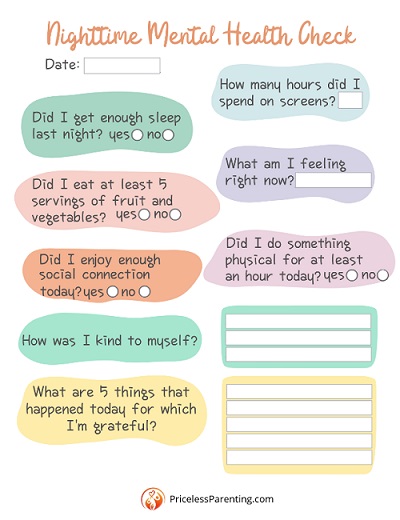Teaching Kids To Keep Themselves Mentally Healthy
by Kathy Slattengren, M. Ed., Priceless Parenting (sign up for monthly parenting newsletter and receive 20+ printable charts for kids and parents)
(listen to article read by the author)

You are likely doing an excellent job teaching your kids to keep themselves physically healthy. You’ve taught them to wash their hands before eating, to brush their teeth and to take a bath or shower. Maintaining a healthy body takes daily effort.
Maintaining a healthy mind also takes daily effort. How are you teaching your kids to keep themselves mentally healthy?
What is Mental Health?
Mental health is not about being happy all the time. In fact
believing your kids should always be happy is a recipe for mental health problems! Your kids need skills for responding to a wide range of emotions every day including feelings of frustration, anger, sadness and loneliness.
Mental health encompasses more than being able to handle your emotions. The World Health Organization defines mental health as “a state of well-being in which every individual realizes his or her own potential, can cope with the normal stresses of life, can work productively and fruitfully, and is able to make a contribution to her or his community.” Let’s look at how this definition applies to your children.
Creating a State of Well-being
Before your kids can realize their potential, they need to have a state of well-being. They need adequate food, water, shelter and rest.
How much sleep do your kids need? The
National Sleep Foundation has the following sleep recommendations:
- Newborns (0-3 months): 14-17 hours
- Infants (4-11 months): 12-15 hours
- Toddlers (1-2 years): 11-14 hours
- Preschoolers (3-5): 10-13 hours
- School age children (6-13): 9-11 hours
- Teenagers (14-17): 8-10 hours
Sleep experts recommend shutting off all electronic devices at least an hour before bedtime. The light and stimulation interferes with being able to relax and get to sleep.
What your kids eat also effects their mental state. Schools have seen positive effects of serving healthier lunches. The article “
How Diet and Nutrition Impact a Child's Learning Ability” states “many schools are banning fast foods, French fries, and chemically processed menu options. Instead, schools are serving whole-grain breads, fruits, vegetables, salads, and lean proteins. Since natural and un-processed foods provide kids with a lower intake of glucose, kids are leaving the lunchrooms now feeling more energized, less lethargic, and more able to focus.” You can also prioritize serving healthy food in your meals and snacks at home.
Coping With Normal Stresses
Stress is part of daily life. In fact,
stress can increase concentration and performance. However, too much stress without a way to relax leads to problems.
What do your kids do to relax and take a break? Some kids enjoy participating in a physical activity like running or shooting baskets to take their minds off of everything. Others like to listen to music or do yoga. The
Cosmic Kids Yoga videos are favorites for kids who enjoy acting out stories using yoga positions.
After your kids outgrow taking naps, they may keep going non-stop all day. Even though they no longer need a nap, kids still benefit from a few minutes of quiet time each day. In response to seeing students overwhelmed with stress and anxiety, some schools are incorporating mindfulness breaks each day. Students use basic meditation techniques to quiet their minds for a few minutes.
Focusing on gratitude is another way to counterbalance stress. Some families name what they are thankful for during dinner time or before bed. Some kids write down three things they are grateful for every night in a gratitude journal. What works best for your family in expressing gratitude?
Working Productively and Fruitfully
What does it mean for your children to work productively and fruitfully? Playing and learning are part of the work of children. When children play together they are learning important interpersonal, physical and social skills. Going to school and doing homework are also part of their work.
What gets in the way of your kids working productively? For many it’s spending too much time on entertainment through TV or digital devices.
Limiting your kids’ screen time gives them time for more fruitful activities.
Contributing to Your Community
How are your kids contributing to your household? By the time they are preschoolers, they can help with chores around the house. Daily chores is one way your kids can contribute to your family community. Having a
chore chart can help them keep track of their chores.
If your kids are older, they are ready to contribute to the larger community outside your home. Teens have a powerful combination of passion and energy to put into positively changing their schools, neighborhoods or the world. Whether your family participates together for a cause or your kids join in helping individually, your family will be making the world a better place!
There are multiple components to mental health. Filling out a
nightly mental health checklist can help your kids monitor how they are doing. When you help your kids in each of the key areas, you will be positively affecting their mental health as well as your own.